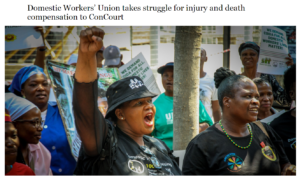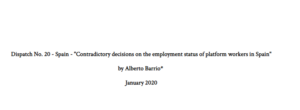Market Inquiry into Land Based Public Passenger Transport: Metered Taxis and E-Hailing Services Report
 Date of Publication: 2020
Date of Publication: 2020
![]() Author: Bellon T
Author: Bellon T
Date of Publication: 2020
Uber Technologies Inc. on Wednesday informed its California customers that it would switch to
providing estimates as opposed to fixed prices for its rides in response to a new law that makes it
harder to qualify its drivers as contractors. [View resource]
Uber stops upfront ride pricing in response to California worker law Read More »
 Author: Gasa S.
Author: Gasa S.
Date of Publication: 2020
South African domestic workers have long been deprived of recognition as employees. The South
African Domestic Service and Allied Workers Union and other activist organisations asked the
Constitutional Court to confirm a High Court ruling, which affirmed domestic workers’ rights. Eight
years after one of their own died at an employer’s home, the ConCourt hearing symbolised the
beginning of closure for the deceased’s daughter. [View resource]
Domestic Workers’ Union takes struggle for injury and death compensation toConCourt Read More »
Author: Alberto Barrio
Date of Publication: 2020
A brief essay describing a significant development in national labor law: legislative, judicial,
administrative. The importance of the development in domestic context should be explained; the
reasons for transnational interest might be suggested. [View resource]
Contradictory decisions on the employment status of platform workers in Spain. Read More »
 Authors: Funda Ustek-Spilda, Richard Heeks, Mark Graham, Alessio Bertolini, NancySalem, Srujana
Authors: Funda Ustek-Spilda, Richard Heeks, Mark Graham, Alessio Bertolini, NancySalem, Srujana
Katta, Sandy Fredman, Kelle Howson, Fabian Ferrari, Mounika Neerukonda, Pradyumna Taduri,
Adam Badger and Pablo Aguera Reneses.
Date of Publication: 2020
The report examines the impact of Covid-19 on gig workers. It’s key findings reflect the following:
Fair Pay: While it remains the most important for workers, we found little evidence of platforms
offering compensation for loss of income. Direct policies to increase pay were mostly advertised by
large multinational platforms, like Uber, but were often only available to a fraction of their
workforce. When government funding became available to gig workers in some countries, platforms
transferred the responsibility over to the governments. Fair conditions 1 (Prevention): More
platforms offered hygiene guidance and protective equipment to workers, especially since many of
these measures became compulsory by governments. ‘Contact-free services’ were also common but
more often oriented towards clients than workers. Fair Conditions 2 (Illness): Just over half of the
platforms surveyed were offering some form of sick pay policy. However, these often consisted of
flat-rate payments that in practice fall below the local minimum wage. Access to the schemes also
remains a contested issue. Where government financial relief was extended to gig workers,
platforms again shifted the responsibility to the state instead of offering extra relief measures. Fair
contracts: The normalisation of platforms offering (some form) of assistance to their workers during
the COVID-19 crisis suggests that the meaning of ‘independent contractor’ has begun to change. [View resource]
The gig economy and covid-19: Looking ahead Read More »
Authors: Thomas Haipeter, Dominick Owczareck, Michele Faioli and Feliciano Ludicone.
Haipeter, Dominick Owczareck, Michele Faioli and Feliciano Ludicone.
Date of Publication: 2020
This report was produced as part of the ‘Don’t GIG up!’ project, co- funded by the Directorate-
General for Employment, Social Affairs and Inclusion of the European Commission, and aimed at
improving expertise and knowledge on the role unions and social dialogue can play with regard to
the protection of gig workers. Running for 24 months (February 2018 – January 2020), the project
brings together unions and research centres to analyse features and challenges of the gig economy
in a set of selected countries, namely Germany, France, Italy, Poland, Spain, and Sweden. More
precisely, the scope of the project is work carried out through labour platforms. At the onset of the
research, such platforms were divided into four groups according to their core activities, as per the
table below. [View resource]
‘Don’t GIG up!’ Report Read More »